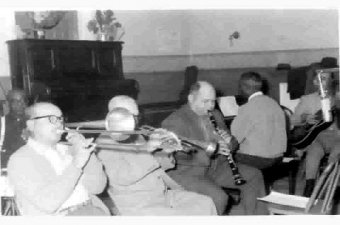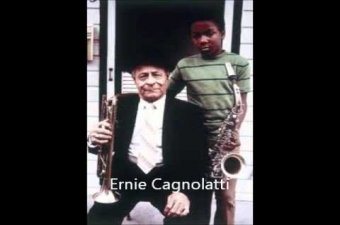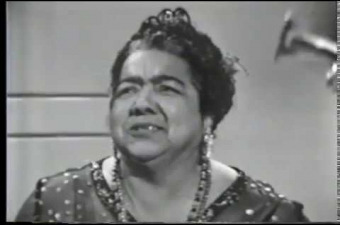Jeunes Amis Hall / Equity Hall
1477 N. RobertsonNew Orleans LA 70116
This building was the headquarters of two Creole benevolent societies that hosted a range of musical performances from the late 19th through mid-20th centuries, including some by jazz pioneers and the city’s top brass band musicians. It was built by La Société Bienfaisance Mutuelle L’Equité around 1880 and known as L’Equité or Equity Hall before being purchased in 1917 by Les Jeunes Amis de Bienfaisance et d’Assistance Mutuelle and referred to as Jeunes Amis Hall.
French-speaking people of color formed these mutual aid associations to provide medical and burial benefits to members, who were refused access to mainstream insurance because of their race. The organizations also presented dances, concerts, and stage productions at their halls, and rented them for special events to other Black organizations in need of gathering space.
The Jeunes Amis (“Young Friends”) society was formed in 1867 largely by cigar makers – not an uncommon day job for Creole musicians. Its ranks included classically trained musicians William J. Nickerson and Daniel F. Desdunes, both of whom built national reputations as leaders of orchestras and music teachers.
In 1893 the Jeunes Amis society extended an honorary membership to another former cigar maker and musician, Edmond Dédé. Born a free Creole of color in 1829, he was a child prodigy on the violin. In 1852 his composition “Mon Pauvre Coeur” became the first piece of sheet music by a Black person to be published in New Orleans. Five years later, fed up with increasingly harsh racism in the city, he immigrated to France, where he became a celebrated composer, conductor, and performer. Visiting his hometown 36 years later, Dédé performed at several Creole society halls. According to the writer Alice Dunbar Nelson, “he was old, but not worn, nor bent, the fire of youth still flashed in his eye, and leaped along the bow of his violin.”
While the Jeunes Amis society was based in other nearby facilities at the time of Dédé’s return, the Equity society presided over a vibrant scene here on North Robertson Street in the late 1800s. Leonard Bechet (1877 – 1952), a trombonist and brother of jazz legend Sidney Bechet, recalled dances before the dawn of jazz, featuring “fine music” by and for “old time” Creoles of color – this included French quadrilles and waltzes, compositions with corresponding formal dances.
Isidore Barbarin (1871 – 1960), a cornet and alto horn player who led the storied Onward Brass Band, played at Equity Hall and considered it “one of the best-looking halls in town.” Barbarin was the patriarch of the musical Barbarin family, which would include his son Paul Barbarin and grandson Danny Barker, two major figures in traditional jazz.
In the early 1900s Bechet and Barbarin saw old-line Creole music surpassed in popularity by a “hot” style associated with Buddy Bolden, an African American bandleader from uptown who improvised bluesy flourishes on his cornet. The new music, later known as jazz, attracted what Leonard Bechet considered a “rough” element to the dance floor.
By 1917, when the Jeunes Amis society moved to this hall, jazz had gained wider social acceptance. So, while it was an elite organization in downtown Creole society, the organization welcomed jazz musicians including “Wooden” Joe Nicholas, Henry “Booker T” Glass, Hypolite Charles, and Lizzie Miles to the bandstand here. Miles (1895 – 1963), called the “Creole Songbird,” sang in English and French, and became a successful recording artist in New York in the 1920s.
By the mid-20th century the rise of Black insurance companies led to the decline of benevolent societies. Still, according David Jones, Jeunes Amis Hall was used for “parties, meetings, and, in 1961, infrequent dances.” That was the year Jones and producer Chris Albertson used the hall as a studio for Riverside Records’ Living Legends series of traditional jazz LPs. Albertson noted that the hall, “apart from its live sound, gave the performers familiar surroundings.” The recordings, by bandleaders including Jim Robinson, “Sweet Emma” Barret, Peter Bocage, and Louis Cottrell, are regarded as some of the finest of the era’s traditional jazz revival.
Videos

This video for "Jeunes Amis Blues" by Jim Robinson includes extensive images of the 1961 sessions at Jeunes Amis Hall, where the song was recorded.
Video posted by Chris Albertson.
This video for "Jeunes Amis Blues" by Jim Robinson includes extensive images of the 1961 sessions at Jeunes Amis Hall, where the song was recorded.

This video for "Take My Hand, Precious Lord" by Jim Robinson's band includes images of Jeunes Amis Hall, where the song was recorded in 1961.
Video posted by Andy Wolfenden.
This video for "Take My Hand, Precious Lord" by Jim Robinson's band includes images of Jeunes Amis Hall, where the song was recorded in 1961.

Lizzie Miles, who sang at Jeunes Amis Hall, performs "Bill Bailey" in English and French in this 1957 television appearance.
Video posted by
Alan Eichler.
Lizzie Miles, who sang at Jeunes Amis Hall, performs "Bill Bailey" in English and French in this 1957 television appearance.
Images








